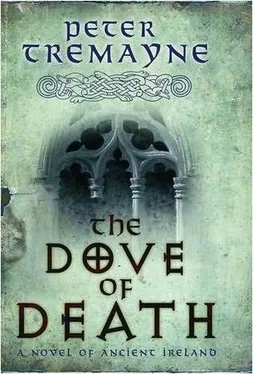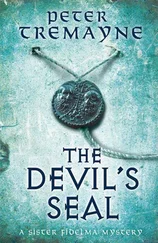Peter Tremayne - The Dove of Death
Здесь есть возможность читать онлайн «Peter Tremayne - The Dove of Death» весь текст электронной книги совершенно бесплатно (целиком полную версию без сокращений). В некоторых случаях можно слушать аудио, скачать через торрент в формате fb2 и присутствует краткое содержание. Жанр: Исторический детектив, на английском языке. Описание произведения, (предисловие) а так же отзывы посетителей доступны на портале библиотеки ЛибКат.
- Название:The Dove of Death
- Автор:
- Жанр:
- Год:неизвестен
- ISBN:нет данных
- Рейтинг книги:5 / 5. Голосов: 1
-
Избранное:Добавить в избранное
- Отзывы:
-
Ваша оценка:
- 100
- 1
- 2
- 3
- 4
- 5
The Dove of Death: краткое содержание, описание и аннотация
Предлагаем к чтению аннотацию, описание, краткое содержание или предисловие (зависит от того, что написал сам автор книги «The Dove of Death»). Если вы не нашли необходимую информацию о книге — напишите в комментариях, мы постараемся отыскать её.
The Dove of Death — читать онлайн бесплатно полную книгу (весь текст) целиком
Ниже представлен текст книги, разбитый по страницам. Система сохранения места последней прочитанной страницы, позволяет с удобством читать онлайн бесплатно книгу «The Dove of Death», без необходимости каждый раз заново искать на чём Вы остановились. Поставьте закладку, и сможете в любой момент перейти на страницу, на которой закончили чтение.
Интервал:
Закладка:
‘You made your disapproval of the conduct of Macliau very obvious. I feel it my duty to point out that you are here under the laws of hospitality, and that although you are honoured in your country of Hibernia, being the sister of a king, here you are a stranger in a strange land. Macliau is the son of the mac’htiern of Brilhag, a descendant of the rulers of Bro-Waroch, and he should be treated with all respect.’
Fidelma’s eyes flashed warningly, which only Eadulf interpreted, and he spoke quickly before she did.
‘You are right to point these things out, Brother Metellus, and we accept them. But these are trying circumstances and we should not have to repeat warnings of the dangers.’
Brother Metellus was also serious. ‘I had some role in this matter, as I recall.’
At once, Fidelma was contrite.
‘My apologies to you, Brother Metellus. You saved us from death. But do you not find it odd that the man we left, well on his way to recovery, was now said to be so ill that he did not survive the night?’
Brother Metellus hesitated a moment. Then he spoke quietly.
‘I am not forgetting why we came to this fortress. I am not forgetting the banner that Biscam held in his lifeless hand — the banner that flies above this very place. But truly I cannot see what reason there would be for the family of Brilhag to be involved in either sea raiding or robbing merchants passing through their country. Having said that, I cannot deny the evidence of the banner.’
‘For the moment, what we know about that banner must remain between us,’ Eadulf advised.
‘Do not worry,’ returned Brother Melletus. ‘I am as concerned about the truth of this as you are.’
‘Then we are agreed,’ Fidelma said. ‘I will try to be more circumspect, but it is frustrating to feel that there is a mystery here and no path to follow to seek it out.’
‘Let us consider this logically,’ Brother Metellus invited. ‘Why would the mac’htiern of Brilhag be behind these actions? Why would he turn sea raider or thief when he is lord of all on this peninsula and indeed, can claim authority throughout all of Bro-Waroch?’
‘You ask good questions, Brother Metellus,’ Fidelma replied. ‘I cannot supply the answers to them yet. In those answers is the solution to the conundrum that faces us: whoever is behind these crimes does them under the banner of this fortress. Now you tell me why that is?’
But Brother Metellus was unable to offer an explanation, and as he struggled to do so, a faint trumpet sounded from beyond the gates.
‘What does that signify?’ asked Eadulf, as he saw Brother Metellus raise his head with a puzzled expression. ‘Is Macliau in trouble?’
‘It is a call to alert the guards of the approach of someone of importance.’
The trumpet sounded again, closer to the fortress, and they all went out together to watch the newcomers’ arrival.
Several guards had now taken up positions. A line of horses was trotting along the track towards the open gates. Warriors rode the first two animals. The next carried a woman, who rode on her own. She was a tall, slim figure, richly clad. Behind her came another woman, then two more warriors, and finally two attendants who were holding the lead reins of two asses on which baggage was strapped.
The cavalcade entered the fortress and came to a halt before the steps leading to the doors of the great hall where Fidelma’s little party stood.
One of the warriors, a good-looking young man, immediately leaped down from his horse and went over to the tall woman’s mount, where he knelt, so that she could use his broad back as a step to alight. No one else moved as she did so. Then she walked slowly over to the steps where Fidelma, Eadulf and Brother Metellus stood. The young warrior came behind her, eyes narrowed as he held them in his keen gaze, his hand resting lightly on the hilt of his sword. They halted at the foot of the steps.
The woman was as tall as Fidelma; her hair was a honey colour, glinting with slight touches of red. Her headdress was fastened around her forehead by a circlet of gold with a gleaming sapphire stone in its centre. Her clothes and jewellery were equally rich, for she had pushed back her blue riding cloak, displaying her costume and jewellery. But it was not these accoutrements that drew Fidelma’s attention. It was her unusual beauty.
The woman was younger than Fidelma and her heart-shaped face had a curious ethereal quality. And yet the firm chin spoke of authority and purpose. Her eyes were soft grey in colour; her red lips owed nothing to artifice.
At this moment of meeting, her grey eyes stared with curiosity into the fiery green of Fidelma’s eyes. Then she spoke in the language of the country.
Brother Metellus coughed nervously, moved a step forward and said something quickly in response.
The grey eyes widened a fraction. The woman did not respond to Brother Metellus but continued to gaze thoughtfully at Fidelma. After this close scrutiny she then addressed her in Latin.
‘I am Riwanon, wife to Alain, King of the Bretons. Why am I requested to speak to you in this language?’
Chapter Nine
Brother Metellus appeared to feel that he should make the explanations and introductions.
‘It is because these strangers do not speak the language of this country, lady. This is the lady Fidelma of Muman in the land of Hibernia. Her companion is Brother Eadulf of Seaxmund’s Ham in the land of the South Folk in the country of the Angles.’
The young woman’s expression did not change, nor did her eyes drop from the steady gaze with which she held Fidelma’s eyes.
‘You and your companion are a long way from home, lady.’ The comment seemed to Fidelma to be a standard opening.
There was an embarrassed cough from Riwanon’s female companion, who was still sitting patiently on horseback, apparently awaiting permission to dismount. Riwanon glanced over her shoulder and then turned back, with an apologetic expression that encompassed the three of them.
‘Until I am formally invited to enter, my attendants sit outside awaiting my pleasure. Are my hosts inside? Why are they not here to invite me to cross their threshold?’
Fidelma immediately realised their bad manners in keeping the wife of the King standing on the steps. She stood back while Brother Metellus explained: ‘Forgive us,’ he said. ‘The mac’htiern is not here, nor is his son, Macliau or his daughter, Trifina. We are guests, but alone here for the time being. So allow me to presume to invite you to enter in their absence, lady.’
‘And your name?’ asked Riwanon.
‘Brother Metellus, lady.’
Riwanon frowned slightly, opened her mouth to say something and then changed her mind. She smiled quickly before passing inside, shadowed by the taciturn young warrior. The three followed her as the female attendant and the relieved escort began to dismount. The attendant hurried to her mistress’s side while the warriors of the escort stretched themselves and chatted with the stable boys who arrived to attend to their wants.
Riwanon strode across the great hall, throwing off her riding cloak, which was deftly caught by her bodyguard, before she sank into a comfortable chair by the fire. The warrior took up a stand behind her.
‘This is the commander of my personal guard, Budic of Domnonia,’ Riwanon announced.
The young man jerked his head forward in a brief acknowledgement. He was handsome, of that there was little doubt. He possessed well-chiselled features, blue eyes and fair hair — and a slight quality of vanity, as if he seemed to know the attraction of his physical qualities. Fidelma took in the gold necklet and ornaments on his arms, and the rich red cloak he sported. Budic was obviously no ordinary young warrior — and then she realised that the introduction ‘of Domnonia’ meant he was of a noble family of that place.
Читать дальшеИнтервал:
Закладка:
Похожие книги на «The Dove of Death»
Представляем Вашему вниманию похожие книги на «The Dove of Death» списком для выбора. Мы отобрали схожую по названию и смыслу литературу в надежде предоставить читателям больше вариантов отыскать новые, интересные, ещё непрочитанные произведения.
Обсуждение, отзывы о книге «The Dove of Death» и просто собственные мнения читателей. Оставьте ваши комментарии, напишите, что Вы думаете о произведении, его смысле или главных героях. Укажите что конкретно понравилось, а что нет, и почему Вы так считаете.











